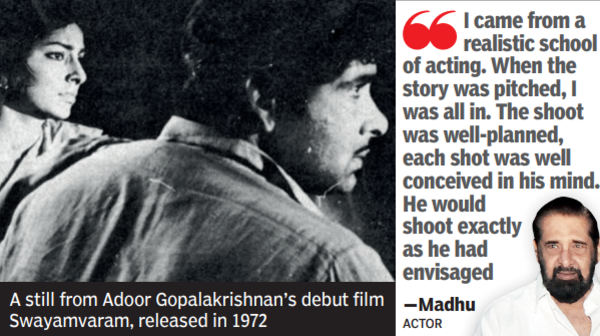The film, starring Madhu and Sarada, was born out of Adoor’s desire to do something meaningful and creative after he had reached a point of frustration doing documentaries for the family planning department after he returned from Film and Television Institute of India.

“‘Swayamvaram’ redefined the cinematic language and narrative in ways which were unimaginable. Adoor was backed by his sound technical training and vision of cinema,” said film critic V K Joseph.
When American Avant Garde filmmaker Andy Warhol made a film named ‘Sleep’ in 1964, the audience became furious. All they saw on screen was a man sleeping; seamless, static footage of sleep and nothing else. The viewers walked out demanding a refund, there are even tales about people walking up to the screen and shouting ‘wake up’. Sleep turned out to be one of the most-famous experimental movies ever made.
Eight years later, a young director Adoor Gopalakrishnan gave a ‘wake up’ call to Malayalam cinema with ‘Swayamvaram’; which marked the 50th year of its release in 2022. His opening scene and soundtrack were revolutionary. Rhythmic shots of passengers in a moving bus set against the rumble of the engine. There was no distinct intercut to introduce lead characters. Instead, they gelled with the assortment of random shots of people. The scene lasted five minutes.
Except for the occasional clank of the bell, the soundtrack was consistent. None of the live faces on screen uttered a word; an unthinkable scene for Malayalam cinema at that time. The film, shunned by viewers and state awards committee, bagged four national awards.
Swayamvaram was released when mainstream stalwarts like KS Sethumadhavan, Kunchacko and PN Menon reigned supreme. Their films Panitheeratha Veedu, Aromalunni and Chemparathi made their mark in theatres and also at state film awards in 1972. Swayamvaram opened to a perplexed set of viewers who kept wondering why Madhu and Sarada weren’t talking. When it made waves nationally, the film made on a budget of Rs 2.5 lakh returned to theatres and drew a bigger crowd and warmer response; something which later became uncharacteristic of an award-winning film.
Adoor had reached a point of frustration doing documentaries for the family planning department after he returned from FTII. The logistic burden of running the film society and cooperative had bogged him down. Swayamvaram was born out of a desire to do something meaningful and creative.
“Swayamvaram redefined the cinematic language and narrative in ways which were unimaginable. Adoor was backed by his sound technical training and vision of cinema,” said film critic VK Joseph.
The film was as much about love as about the sense of loss. The pasts of the characters were irrelevant. It was all about choices and crises. The lead male character walks away from revolt, gets weak in the face of crisis, even weeps and asks forgiveness while Sita, his partner sticks to her choices, masking the bleak uncertainty with an enigmatic resolve.
As the film progresses, the initial bus journey morphs into a journey from ambition and dreams to one of bitterness and sore realities. Adoor captures the moral crisis and unstoppable descent into deprivation with a candour that was shorn of meek sentimentalism. He didn’t even attempt to resolve the crisis; further elevating the film to novel realms.
Actor Madhu recalled how the film synced perfectly with his background. “I came from a realistic school of acting. When the story was pitched, I was all in. The shoot was well-planned, each shot was well conceived in his mind. He would shoot exactly as he had envisaged,” he said.